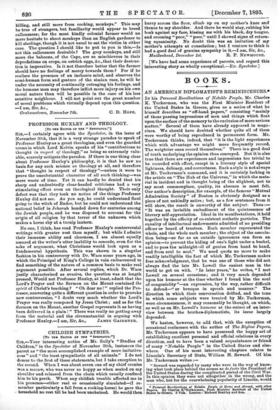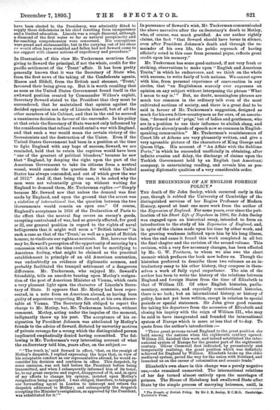BOOKS.
AN AMERICAN DIPLOMATIST'S REMINISCENCES.* IN his Personal Recollections of Notable People, Mr. Charles K. Tuckerman, who was the First Minister Resident of the United States in Greece, gives us a series of what he himself describes as "off-hand papers," consisting "mainly of those passing impressions of men and things which float upon the surface of the memory to the exclusion of more serious matter." Several of them have already appeared in maga- zines. We should have doubted whether quite all of them were worthy of being reproduced in permanent form. Mr.
Tuckerman thinks, indeed, that "it is the light experiences which with advantage we might more frequently record.
The weightier ones record themselves." There is a good deal of truth underlying the opinion thus conveyed. But it is also true that there are experiences and impressions too trivial to be recorded with effect, except in a literary style of special lightness, delicacy, and correctness. Such a style is not always at Mr. Tuckerman's command, and it is certainly lacking in the article on "The Hub of the Universe," in which the mate- rial in ineident and in thought being of the slightest, not to say most commonplace, quality, its absence is most felt. Our author's description, for example, of the famous "Mutual Admiration Society" of Boston is obviously designed as a piece of not unkindly satire ; but, as a few sentences from it will show, the result is unworthy of the subject. Thus :— " It was an invisible embodiment of the quintessence of literary self-appreciation. Ideal in its manifestations, it held together by the affinity of co-existent msthetic particles. The equality of intellectual endowments admitted of no presiding officer or board of trustees. Each member represented the- whole, and the whole each member ; the object of the associa- tion being—so far as an outside ignoramus can form an opinion—to prevent the hiding of one's light under a bushel, and to pass the midnight-oil of genius from hand to hand, and from soul to soul." We need quote no more to make readily intelligible the fact of which Mr. Tuckerman makes free acknowledgment, that he was one of those who did not always find the late Mr. Lowell the easiest man in the world to get on with. "In later years," he writes, "I met Lowell on several occasions ; and it very much depended upon his humour at the time whether I found him the soul of congeniality "—an expression, by the way, rather difficult to defend—" or brusque in speech and manner." The direction in which their conversation drifted, and the tone in which some subjects were treated by Mr. Tuckerman, were circumstances, it may reasonably be thought, on which, as well as on Mr. Lowell's humour at the outset of an inter- view between the brotheadiplomatists, its issue largely depended.
We hasten, however, to add that, with the exception of occasional coolnesses with the author of The Biglow Papers, Mr. Tuckerman appears to have possessed the happy art of establishing excellent personal and official relations in every direction, and to have been a valued acquaintance or friend of many "Notable People" in the United States and else- where. One of his most interesting chapters relates to Lincoln's Secretary of State, William H. Seward. Of him Mr. Tackerman writes e-
" Seward was regarded by many who were in the way of know- ing what took place behind the scenes as de facto the President of the United States during the complicated period of the Civil War. In this opinion they were not altogether in the wrong, and the man who, but for the overwhelming popularity of Lincoln, would • Personal Recollections of Notable People at Home and Abroad, with other Papers. By Charles rsTnekerman, First Minister Resident of the United States to Greece. 2 Vol.. London: Rich‘rd Bentley and Son. have been elected to the Presidency, was admirably fitted to supply those deficiencies in his chief resulting from inexperience and a limited education. Lincoln was a rough diamond, although a diamond of the first water so far as natural perspicacity and far-reaching comprehension were concerned. His conceptions were grand and statesmanlike, but in the carrying out of his ideas ke would often have stumbled and fallen had not Seward come to nis euppurt with clearer notions of expediency and procedure."
In illustration of this view Mr. Tuckerman mentions facts giving to Seward the principal, if not the whole, credit for the pacific settlement of the Trent' affair. It has been pretty generally known that it was the Secretary of State who, from the first news of the taking of the Confederate agents, Mason and Slidell, from the British mail steamer, 'Trent,' favoured their being given up. But it is worth recalling that as soon as the United States Government found itself in the awkward position created by Commander Wilkes's exploit, Secretary Seward stated to the President that they must be surrendered, that he maintained that opinion against the decided opposition not only of Lincoln himself, but of all the other members of his Cabinet, and that in the end he secured a unanimous decision in favour of the surrender. In his policy at that crisis the Secretary of State was not only influenced by the consideration that refusal would entail a war with England, and that such a war would mean the certain victory of the Secessionists and the destruction of the Union. Even if the United States Government had been in a position at the time to fight England with any hope of success, Seward, we are reminded, held that to retain the captives would have been "one of the greatest of political blunders," because he saw that "England, by denying the right upon the part of the American Government to take its citizens from a neutral vessel, would concede the question for which the United States has always contended, and out of which grew the war of 1812." And if, that being the case, it be asked why the men were not voluntarily given up without waiting for England to demand them, Mr. Tuckerman replies :—" Simply because Mr. Seward saw that unless the demand was first made by England, and upon the ground that the arrest was
a violation of international law, the question between the two Governments would remain an open one." Of course, England's acceptance in 1856 of the Declaration of Paris to the effect that the neutral flag covers an enemy's goods, excepting contraband of war, had so gravely affected, for good or ill, our general position in regard to the rights of naval belligerents that it might well seem a "British interest" in
such a case as that of the Trent,' as well as a point of British honour, to vindicate our rights as neutrals. But, however that may be, Seward's perception of the opportunity of securing by a concession which at the time could not but be mortifying to American feeling, what might be claimed as the practical establishment in principle of an old American contention, was undoubtedly an evidence of diplomatic acumen, and probably facilitated the tranquil settlement of a dangerous difference. Mr. Tuckerman, who enjoyed Mr. Seward's friendship, tells an anecdote bearing upon Motley's resigna- tion of the post of American Minister at Vienna, which casts a very pleasant light upon the character of Lincoln's Secre- tary of State. It appears that Mr. Motley had been repre- sented, in a note from an American abroad, as having been guilty of aspersions respecting Mr. Seward, at his own dinner- table at Vienna. The Secretary felt obliged to report the charge to Mr. Motley, but, Mr. Tuckerman believes, without comment. Motley, acting under the impulse of the moment, indignantly threw up his post. The acceptance of his re- signation by President Johnson was attributed by Motley's friends to the advice of Seward, dictated by unworthy motives of private revenge for a wrong which the distinguished person implicated emphatically denied having committed. The fol- lowing is Mr. Tuckerman's very interesting account of what the ex-Secretary told him, years after, on the subject :—
" The truth is,' said Seward in effect, that, on the receipt of Motley's despatch, I replied expressing the hope that, in view of his acceptable conduct as our representative abroad, he would re- consider his decision and continue in office. This despatch, by some omission, was not laid before the President before being transmitted, and when I subsequently informed him of its tenor, be, to my great surprise and regret, disapproved of it, and, in spite of my efforts to change his opinion, insisted upon Motley's resignation being accepted. I was obliged, therefore, to telegraph our forwarding agent in London to intercept and return the despatch addressed to Motley; and subsequently the despatch accepting the Minister's resignation, as approved by the President, was substituted for it."
In pursuance of Seward's wish, Mr. Tuckerman communicated the above narrative after the ex-Secretary's death to Motley, who, of course, was much gratified. As our author rightly claims, the fact "that Seward should have borne in silence, even after President Johnson's death and through the re- mainder of his own life, the public reproach of having officially acted in this case from personal pique, reflects great credit upon his memory."
Mr. Tuckerman has some good-natured, if not very fresh or striking, observations to make upon "English and American Traits," in which he endeavours, and we think on the whole with success, to write fairly of both nations. We cannot agree with him, from personal experience of conversation in any circles, that "an Englishman scarcely ever expresses an opinion on any subject without interposing the phrase 'What I mean to say is.'', But, no doubt, meaningless phrases are much too common in the ordinary talk even of the most cultivated sections of society, and there is a great deal to be said in favour of Mr. Tuckerman's suggestion, designed as much for his own fellow-countrymen as for ours, of an associa- tion, "formed not of prigs,' but of ladies and gentlemen, who are in a position to use their influence to abolish slang, and modify the slovenly mode of speech now so common in English- speaking communities." Mr. Tuckerman's reminiscences of Court life at Athens are very pleasantly written, and give a very agreeable picture of the characters of Bing George and Queen Olga. His account of "An Affair with the Sublime Porte," in which he succeeded unofficially in obtaining, after infinite evasion and delay, the discharge of claims upon the Turkish Government held by an English (not American) company, is entertaining reading, and reveals him as pos- sessing diplomatic qualities of a very considerable order.























































 Previous page
Previous page